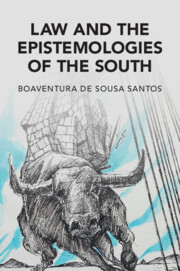Book contents
- Law and the Epistemologies of the South
- CAMBRIDGE STUDIES IN LAW AND SOCIETY
- Law and the Epistemologies of the South
- Copyright page
- Contents
- Preface
- Abbreviations
- Part One The Tragic Optimism of the Law: THE END OF A STORY
- One Unsettling Times
- Two The End of Legal Reformism?
- Three The Early Demise of Legal Reformism: My Journey through the Law and Modernisation Program at Yale University
- Four Room for Manoeuvre: Paradox, Programme, or Pandora’s Box?
- Part Two Epistemologies of the South and the Law
- Part Three The Abyssal Law under the Mode of Abyssal Exclusion
- Part Four Real Legal Utopias: Interrupting the State
- Part Five Real Legal Utopias: Interrupting the Law
- Part Six Real Legal Utopias: Interrupting Hegemonic Human Rights
- References
- Index
- Cambridge Studies in Law and Society
Three - The Early Demise of Legal Reformism: My Journey through the Law and Modernisation Program at Yale University
from Part One - The Tragic Optimism of the Law: THE END OF A STORY
Published online by Cambridge University Press: 07 August 2023
- Law and the Epistemologies of the South
- CAMBRIDGE STUDIES IN LAW AND SOCIETY
- Law and the Epistemologies of the South
- Copyright page
- Contents
- Preface
- Abbreviations
- Part One The Tragic Optimism of the Law: THE END OF A STORY
- One Unsettling Times
- Two The End of Legal Reformism?
- Three The Early Demise of Legal Reformism: My Journey through the Law and Modernisation Program at Yale University
- Four Room for Manoeuvre: Paradox, Programme, or Pandora’s Box?
- Part Two Epistemologies of the South and the Law
- Part Three The Abyssal Law under the Mode of Abyssal Exclusion
- Part Four Real Legal Utopias: Interrupting the State
- Part Five Real Legal Utopias: Interrupting the Law
- Part Six Real Legal Utopias: Interrupting Hegemonic Human Rights
- References
- Index
- Cambridge Studies in Law and Society
Summary
This chapter is a report on the first stage of a long journey through the field of law in society. I analyse how, today and in retrospect, I see the historical and political context of the Law and Modernization Program [L&MP] at Yale University in the early 1970s. On the dark side, the L&MP was part of an imperialist project that focused on US economic, geopolitical, and national security interests. Beyond the surface of official declarations, the funders of the Program had little concern for the rule of law and even less for democracy. Then, as now, academics coming from outside the core of the world system to participate in these types of programmes have to play the game. Most of them are eager to do so. Others, like myself and many of my fellow students, see the game as a contested terrain that allows for contradiction and points of leakage through which it is possible to carry out one’s academic work with mental reservations whilst preserving integrity. On the bright side, as a project-in-action, and thanks to its directors, the L&MP allowed us to build a scientific community, a sense of being part of a plural, independent, free, and collective endeavour that was leading to a new field within the social sciences in which critical sociology was far from marginal. There was an overflowing excitement that inscribed itself forever in our personal and academic lives.
Keywords
- Type
- Chapter
- Information
- Law and the Epistemologies of the South , pp. 38 - 64Publisher: Cambridge University PressPrint publication year: 2023

